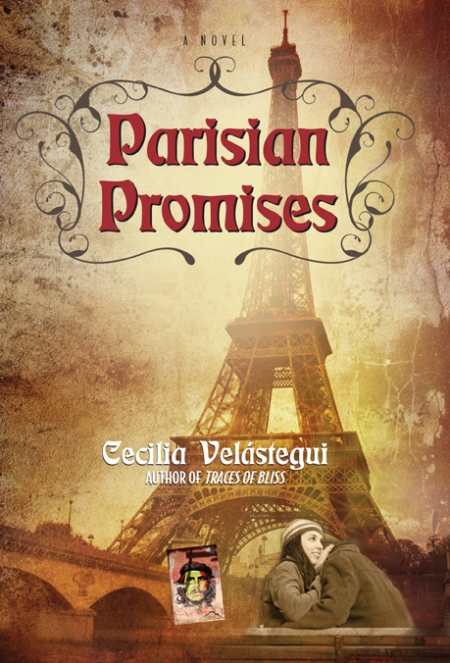Parisian Promises
Four young women find love in the romantic mystique of Paris in this vibrant, wholly unforgettable novel.
The year is 1973; the place is Paris. Four young women get lost in misadventures, danger, and fulfillment in a comedic, romantic mystery by world-traveling novelist Cecilia Velástegui.
The four female college students “were determined to make Paris into the experience each one had concocted for herself like a tipsy bartender.” Karen will burn out seeking the Parisian mystique; Annie will trade life abroad for romantic involvement back home; and Lola … “whatever Lola wants, Lola gets.” But it is Monica, the central character, who falls under the spell of “a vagabond devil,” ETA terrorist and “Che look-alike” Jean-Michel, while simultaneously being drawn to a safer, happier liaison with Christophe, a successful attorney disguised as a stable boy. Christophe can give Monica the world—but will she choose the underworld instead?
In a “three-day transformation from a naïve optimist to a broken-down weakling,” Jean-Michel breaks Monica’s will. But even as his evil magnetism pulls her, the attentions of the respectable Christophe are an anchor. Help comes from unexpected sources: elegantly faded beauty Madame Caron de Pichet, and Serge, a grizzled former member of the Resistance.
The deftly constructed story line moves these intellectually and sensually driven females, all immersed in the timeless mystique of Paris, from seamy arrondissements to lush villas. Velástegui builds her characters with nuanced layers: suave Jean-Michel gloats to himself that he is driving Monica to do his bidding; during the war, Madame de Pichet, who now appears dotty and prudish, “used to lie naked alongside her conquests … silently memorizing locations and numbers of troops” that her military lovers would reveal after accepting her favors; and Monica, who continually chides herself for her “dull birdbrained perspective,” will grow into an artist who can appreciate love.
The author’s cinematic images vividly recall the time and place: “clusters of disgruntled labor unions” join “groups protesting nuclear testing … [all] looking excited to be part of the legacy of the French student protests of 1968.” The book floats along, buoyed by the author’s skill with language, including her knowledge of idiomatic French and her apparent familiarity with the story’s setting. As Madame de Pichet tells the girls, “Enfin, you see, Paris is the center of the world.”
Velástegui’s multilingual twists of words, her skillfully textured plot, and her ability to convey the pleasures and perils of love make Parisian Promises a novel to remember. Author of three other novels featuring vibrant, romantic females seeking self-discovery in exotic locations, Velástegui is a writer whose work merits wider recognition.
Reviewed by
Barbara Bamberger Scott
Disclosure: This article is not an endorsement, but a review. The publisher of this book provided free copies of the book and paid a small fee to have their book reviewed by a professional reviewer. Foreword Reviews and Clarion Reviews make no guarantee that the publisher will receive a positive review. Foreword Magazine, Inc. is disclosing this in accordance with the Federal Trade Commission’s 16 CFR, Part 255.

